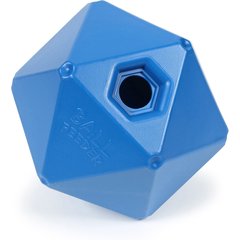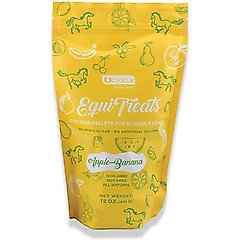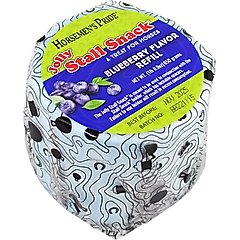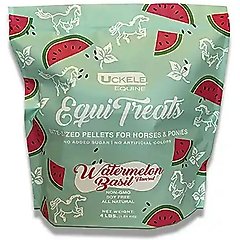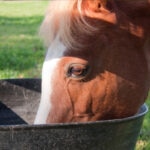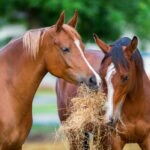Can Horses Eat Grapes?
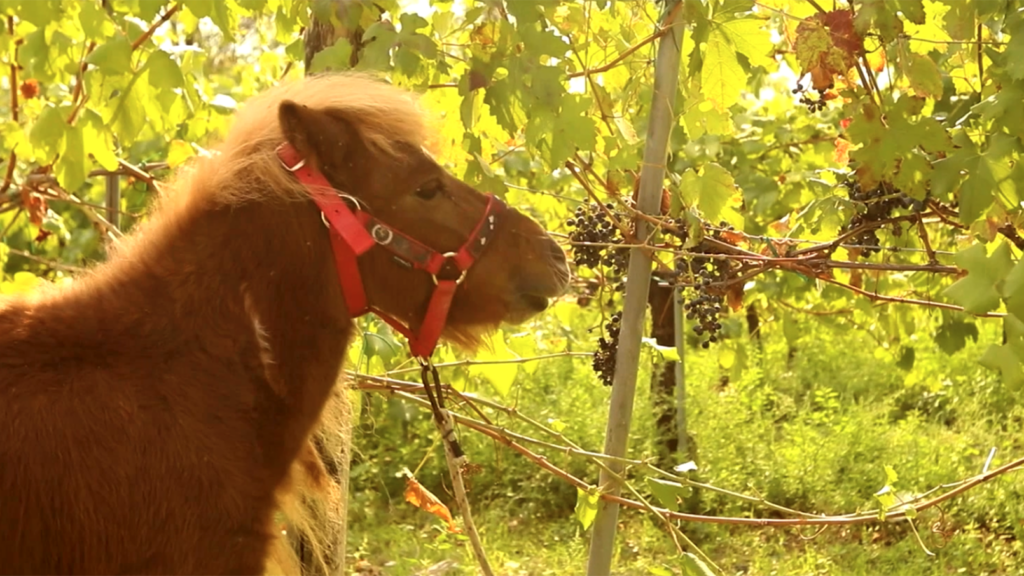
Photo by MPstudio/Creatas Video+/Getty Images Plus
A handful of cold grapes makes a tasty, antioxidant-packed snack after a riding lesson, especially in the summer heat. But can horses eat grapes too? The short answer is yes, in moderation—but fruits should only be fed as treats, never as a primary component of a horse’s diet or as a replacement for forage.
Before introducing any new food into your horse’s diet, always check with your veterinarian.
Can Horses Have Grapes?
Most horses can safely eat small amounts of grapes as an occasional treat.
“A few grapes won’t harm a horse, but they are sugary and could be a problem for horses sensitive to sugar,” says Merle DerVartanian, DVM, of Conejo Valley Equine in Thousand Oaks, California.
The best way to feed grapes to horses is by offering fresh, washed grapes cut into small pieces. Processed grape products, like jelly, juice, and raisins, generally contain added sugar and are a less healthful choice for horses than fresh grapes.
Are Grapes Good for Horses?
Possibly. Grapes can offer a couple of health benefits for horses, including:
- It can act as an anti-inflammatory or antioxidant. While there are no known benefits for horses from grapes as a whole, “there is ongoing research on the benefits of grape seed extract as an anti-inflammatory or antioxidant,” says ProTrition nutritionist Grey Parks, MS. However, “it would take a lot of whole grapes to get a meaningful dose of resveratrol [a type of antioxidant].” Consider asking your vet if a grape seed extract supplement is right for your horse.
- It may help promote wound healing of minor cuts and scrapes. You can try grape balm, which is made with grape seed extract and can help soothe wounds.
- It’s lower in sugar and sodium than some processed treats. Choosing grapes over processed snacks can reduce sodium and sugar intake, when fed in small amounts.
Grapes also contain important nutrients—just not in quantities that are meaningful to horses eating a few grapes at a time. In humans, nutritional benefits of grapes include:
- Antioxidants, which may reduce inflammation, and even protect against cancer and heart disease.
- Vitamin C, which can strengthen the immune system
- Fiber, which may help lower cholesterol
- Minerals, like calcium, magnesium, and potassium, which are important for growing and maintaining healthy bones
- Vitamin K, which can contribute to bone health, as well as proper blood clotting after an injury
Are Grapes Bad for Horses?
Grapes are safe for most horses in moderation, but could be bad for sensitive horses or if fed in large quantities. Here are some potential concerns to keep in mind:
- Eating very large amounts could lead to toxicity in horses, the same way even one or two grapes can cause renal failure in dogs. There are currently no studies or published case reports on kidney failure in horses related to grapes. Still, horses with known kidney problems are probably better off avoiding grapes.
- Grapes are high in sugar. Horses with laminitis, equine metabolic syndrome, insulin resistance, or other conditions sensitive to sugar should not eat fruits, including grapes.
- They pose a choking hazard if not thoroughly chewed. Some horses may try to swallow whole grapes without chewing, creating a potential choking hazard. If you want to offer grapes as a treat for your horse, cut them into small pieces first and feed only a few grapes at a time.
- Eating too many treats can lead to digestive upset, especially in horses who are not accustomed to a varied diet. Always introduce new treats slowly and with the advice of your equine veterinarian.
Never feed a horse you don’t own without discussing it with the horse’s owner. If you want to give a treat to a friend or neighbor’s horse, it’s crucial to ask for permission every time. Horses may have a variety of medical conditions requiring a strictly limited diet.
How Many Grapes Can I Give My Horse?
Fruits are considered treats for horses. Parks recommends that treats make up no more than 1% of a horse’s daily diet by weight. The bulk of a horse’s nutrition should come from a well-balanced diet primarily consisting of forage, such as hay or pasture.
For example, if your horse eats 30 pounds of feed each day, 1% of their diet by weight is 4.8 ounces, so they can have about 5 ounces of treats per day.
Five grapes weigh an average of 1 ounce. So, if you fed your horse no treats other than grapes, you could theoretically offer them up to 25 grapes in a day. But, according to Dr. DerVartanian, it’s best to stick to five or fewer grapes at a time, especially if grapes are a new treat for your horse or if they are sensitive to sugar.
| Horse Size | Serving Size | Frequency |
|---|---|---|
| Small (under 600 pounds) | 2–3 grapes | Daily or every other day |
| Average (600–1,100 pounds) | 3–5 grapes | Daily or every other day |
| Large (1,000+ pounds) | 5 grapes | Daily or every other day |
Introduce any new food item slowly to reduce the chance of digestive upset.
If you keep serving sizes small, it’s OK to feed grapes daily or every time you visit your horse.
How To Safely Feed Grapes to Horses
Moderation is the most important part of safely feeding any treat to horses, including grapes. To maximize safety, you can also take a few extra steps:
- Wash the grapes. This can help remove pesticide residue or any other contaminants from the harvesting process.
- Cut grapes into pieces. The smaller the pieces, the less likely it is your horse will gobble their treat too fast and choke.
- Place grapes in a bucket or feed pan. Feeding from a container, rather than by hand, reduces the risk of an accidental bite when giving treats to your horse. If your horse loves grapes, using a few grapes as a top dressing can even help encourage them to eat feed that contains less-tasty medication or supplements.
- Consider using a foraging toy. Forage toys like snuffle mats and treat balls, like the Shires Equestrian Products Ball Horse Feeder, can help provide environmental enrichment for horses, increasing their emotional well-being and potentially improving their behavior.
- Remove any uneaten grapes. If your horse hasn’t eaten their grapes within an hour of serving, they’re probably not going to. Don’t leave uneaten fruit in your horse’s stall or paddock to ferment and attract pests.
Recommended Product
My Horse Ate Too Many Grapes—What Do I Do?
If your horse got into your cooler or grocery bag and ate too many grapes, don’t panic—but do give your equine veterinarian a call for advice. Then, watch your horse for any signs of illness, including:
- Colic symptoms such as refusal to eat; quiet or absent gut sounds; biting or kicking at the sides; sweating without exercise; and straining to pass manure without success
- A change in urine quantity or color
- Diarrhea
- Signs of choke, like excessive salivation or feed material coming from the nose, coughing, gasping, gulping, or inability to swallow
- New or worsening hoof pain, especially with a strong digital pulse
- Unexplained behavior changes
If you notice these or any other concerning symptoms after your horse has eaten too many grapes, call your equine veterinarian right away and follow their advice carefully. Horses cannot easily vomit, so urgent medical care may be needed for digestive upset.
What Other Fruits Can Horses Eat?
Horses can enjoy a wide variety of fruits as occasional treats. Adding variety to your horse’s diet provides mental stimulation, especially if used as part of an enrichment program stimulating natural foraging behavior.
Try treating your horse with pieces of these fruits:
- Bananas
- Berries
- Melons
- Apples
- Pumpkin
- Cherries (without pits)
Recommended Products
For sugar-sensitive horses or overweight horses who need a strictly controlled diet, Dr. DerVartanian notes that some of her patients enjoy iceberg lettuce. “It’s like feeding water,” she says. “No nutritional value at all, but it makes them feel included in treat time.”
FAQs About Grapes for Horses
Q: Can foals eat grapes?
A: Nursing foals may not be able to chew treats like grapes. Don’t feed treats until your foal is beginning to chew other solid foods like hay and grain. When your foal is close to weaning, ask your vet about when you can start offering treats, including grapes.
Q: Can horses eat grape vines?
A: Grape vines should not be a staple of a horse’s diet or intentionally planted in horse pastures, but occasionally nibbling a grape vine is unlikely to harm your horse.
Q: Can horses have grape juice?
A: Horses should not have grape juice that contains added sugar. If you juice grapes at home, a little juice is OK—but whole grapes contain beneficial fiber and are more healthful than grape juice.
Q: What fruits are toxic to horses?
A: Avocados are potentially toxic to horses. Horses also should not eat fruits that are members of the nightshade family, like tomatoes and eggplants, because they may cause digestive upset. Fruit pits are a choking hazard, so horses should never be offered whole stone fruits, such as peaches and plums.
Attributions
This content was medically reviewed by Courtnee Morton, DVM, Chewy veterinarian.
